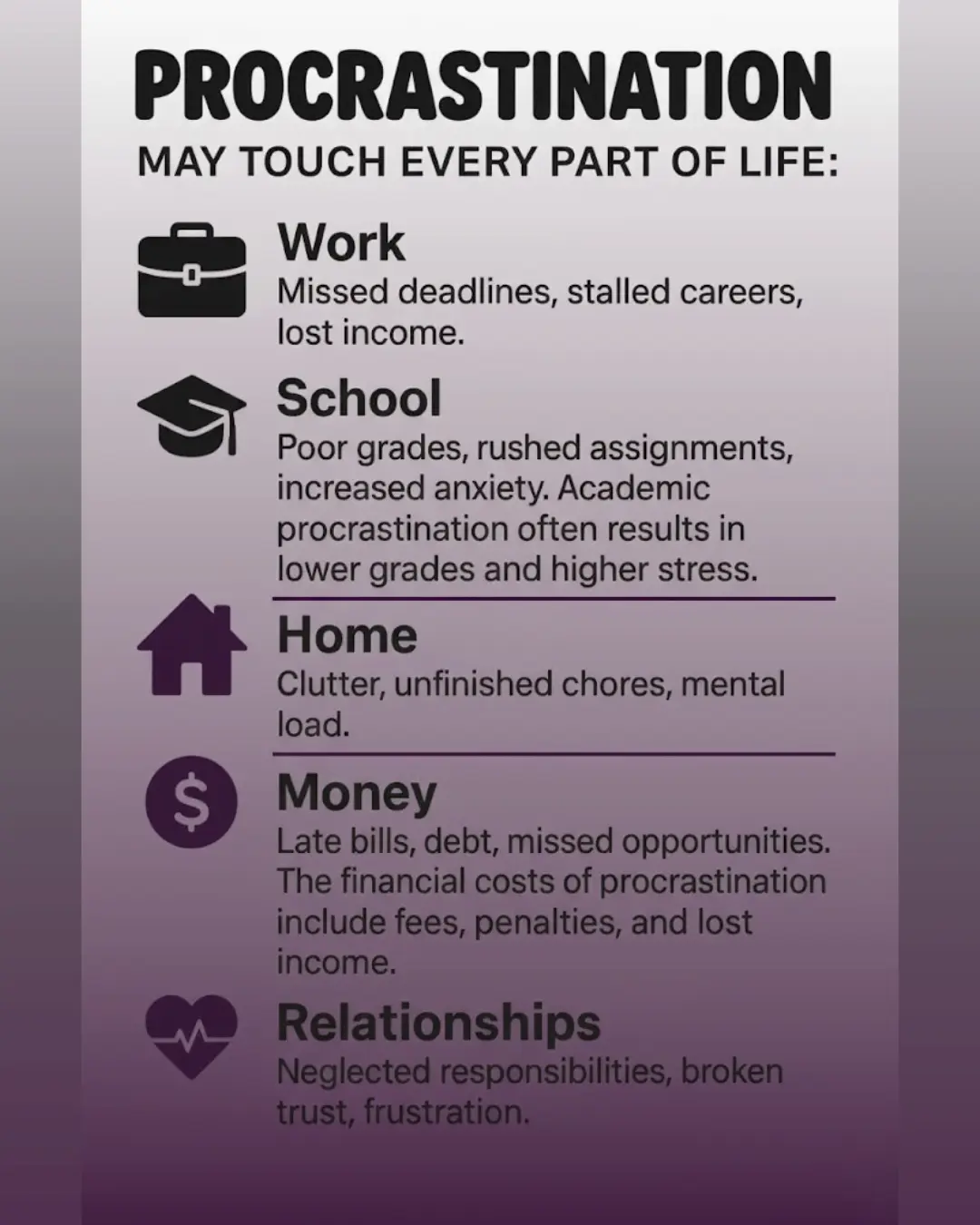How To Beat Procrastination: The Enemy of Progress

Procrastination wastes time, adds stress, delays goals, and erodes your self-confidence. It creates a mental fog that clouds your decision-making and leaves you feeling stuck. Most people don’t procrastinate because they’re lazy.
They do it because of fear, perfectionism, or a lack of clarity about what to do next. The science behind procrastination shows that emotional regulation plays a major role. People procrastinate to avoid negative emotions, not the task itself.
Procrastination vs. Laziness
They aren’t the same.
Procrastination is the act of delaying something you want or need to do, despite expecting negative consequences. Laziness is choosing not to do it at all. Procrastinators often stay busy with low-value tasks to avoid more important ones. Lazy people don’t even try.
A procrastinator might clean their house instead of writing a report. A lazy person won’t get off the couch.
Understanding this difference is crucial. One is about avoidance driven by discomfort. The other is about an unwillingness to act. Chronic procrastinators may look lazy from the outside, but their behavior stems from deeper psychological causes.

Why We Procrastinate
Procrastination is emotional. You delay tasks that make you uncomfortable, even if you know they’re important. You might fear judgment, feel overwhelmed, or doubt your abilities. The task becomes bigger in your mind the longer you avoid it.
According to Piers Steel, a professor of psychology at the University of Calgary, procrastination tends to be a self-defeating behavior pattern rooted in impulsivity and poor emotional control.
Types of Procrastination
Many people deal with a mix of these. Recognizing your pattern is step one. For example, do you delay starting projects because you’re unsure where to begin, or because you fear the outcome? Understanding this difference helps you choose the right strategy.
The psychology at DePaul University found that procrastinators often struggle with aspects of executive functioning, which impairs decision-making.
The Impact
Procrastination may touch every part of life:
Procrastination doesn’t stay in one area. It spreads. Stress from missed work deadlines can bleed into your personal life, affecting your sleep, health, and relationships.
Delaying health checkups can lead to bigger issues. Putting off hard conversations can damage trust. People who procrastinate often experience more stress, higher cortisol levels, and even stress-related illness.

Strategies to Beat Procrastination
- Break It Down
Divide large tasks into small, manageable steps. Writing one sentence is easier than writing a full report. Progress builds confidence. It makes the task in front of you feel less daunting. - Use Time Blocks
Schedule blocks of focused time, and use a timer. Turn off distractions. Commit to 25 minutes of effort. This method boosts self-control and time management. - Set Priorities
Identify your top three tasks each day. Focus on what matters. Finish what moves the needle. Choosing what to prioritize helps stop procrastination. - Positive Self-Talk
Replace negative thoughts with constructive ones. “I don’t have to get it perfect, I just need to get it started.” - Plan Ahead
Use a calendar, planner, or digital tool. Map out your week. Know what’s coming. Strong time management skills reduce the risk of delay. - Track Your Time
Write down how you spend your hours. Find time leaks. Be honest. Use that info to shift your schedule and eliminate non-productive habits. - Build Habits
Start small. Tie new habits to existing routines. For example, after your morning coffee, spend 10 minutes on your top task. Building habits makes procrastination less likely. - Learn to Say No
Guard your time. Say no to non-essentials. Don’t take on things that distract from your goals. - Environment Matters
Declutter your workspace. Keep tools within reach. Make your environment support your effort. A clear space improves focus. - Celebrate Small Wins
Finish one step? Celebrate. Momentum comes from progress. It’s easier to change habits when you feel rewarded.
Subscribe to Create Higher Vibrations!
Get Inspiration and Practical advice straight to your inbox.
Get Started Now
Procrastination is a habit, not a character flaw. Habits change with action. You don’t need to wait for motivation. Start, and the motivation will follow.
The rewards and punishments associated with task completion play a role in procrastination behavior. Delaying or postponing small tasks builds a habit of putting things off.
Pick one task you’ve been avoiding, break it into smaller steps, and take the first action. Momentum builds when you move. Then do it again tomorrow.
Every step forward makes the next one easier. Your future self will thank you for every decision you make today to beat procrastination.
If you want less stress, stronger self-control, and better results, it’s time to fight procrastination. Define procrastination in your life. Understand the cause of procrastination that holds you back.
Whether it’s maladaptive habits, poor time management, or perfectionism, delaying a task can be changed. Even people likely to procrastinate or chronic procrastinators can improve. Conscientiousness and emotional awareness are traits you can develop.
Procrastination isn’t fixed. You can stop procrastinating, manage time, and live with less stress. Don’t let procrastination behavior define your day.
Create a to-do list, focus on the task in question, and make a habit of completing the task. Non-procrastinators tend to be motivated by long-term goals. Start acting with that mindset.
You don’t have to be perfect. You just need to start.
Understanding Chronic Procrastination
Your Questions Answered
What is chronic procrastination and how does it differ from occasional procrastination?
+Chronic procrastination is a persistent habit of putting off important tasks across work, home, and social life. It’s more than a one-time delay. It can lead to missed deadlines, ongoing stress, strained relationships, and health problems. Unlike occasional procrastination, it feels like a cycle you can’t escape.
Is procrastination simply a matter of laziness?
+No, it’s rarely about laziness. Chronic procrastination often stems from fear, perfectionism, or feeling overwhelmed. It’s a mental tug-of-war between wanting relief now and trying to plan for later.
What psychological factors contribute to procrastination?
+Negative thought patterns, poor emotional control, anxiety, self-doubt, and rigid beliefs can all fuel the habit. Procrastination often works as a short-term fix for uncomfortable feelings.
How can fear of success or failure contribute?
+Tasks that challenge your identity, like starting something new or aiming higher, can trigger fear. The fear of failing or even of succeeding can freeze you in place. You delay to protect how you see yourself.
Can self-perception and identity influence procrastination?
+Absolutely. If you label yourself “not a writer,” you may avoid writing tasks to stick to that identity. The stronger the label, the easier it is to put things off.
How might perfectionism be linked?
+Perfectionists set standards so high that starting feels impossible. The fear that work won’t be good enough can lead to endless delays or “paralysis by analysis.”
What strategies help overcome procrastination?
+- Make starting easy, set up your space or break tasks down.
- Try the “just 10 minutes” rule. Start small and keep going.
- Challenge negative self-talk and show yourself some kindness.
- Reward small wins to stay motivated.
- Remove distractions and get support from others.
When should you seek professional help?
+If procrastination seriously impacts your health, relationships, or work, it may be time to talk to a therapist. Professional support can help you break the cycle and address deeper patterns.


